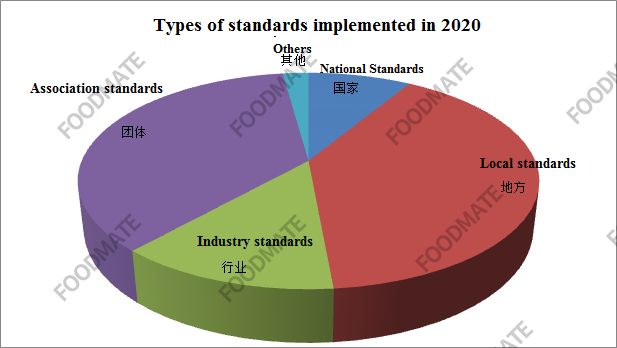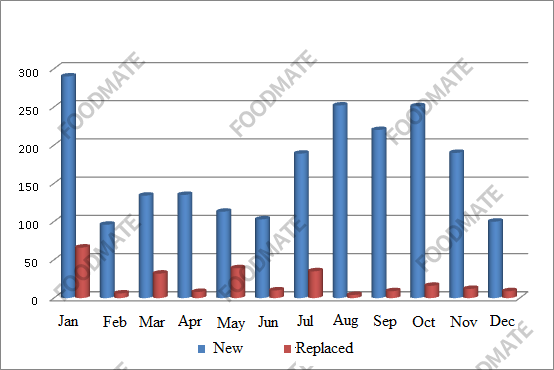According to incomplete statistics of Foodmate, from January to December 2020, a total of 2,319 food and related standards were officially implemented, an increase of 80% over the same period.
Among the standards implemented in 2020, there are 200 natio
nal standards, 926 local standards, 304 industry standards, 839 association standards, and 50 other standards. These standards involve product or raw material standards, testing method standards, regulations, etc. Among them, industry standards involve aquatic product standards, agricultural standards, hygiene standards, light industry standards, chemical standards, machinery industry standards, certification and accreditation industry standards, and entry-exit inspection and quarantine industry standards.
According to statistics, 2073 new standards formulated in 2020 and 246 standards were replac
ed. The new standards account for 89.4% of the total number.
It is worth noting that the new pesticide and veterinary drug residue standards will be formally implemented in 2020. From February 15, 2020, GB 2763-2019 “Natio
nal Food Safety Standard, Maximum Residue Limits of Pesticides in Foods" was officially implemented. From April 1, 2020, GB 31650-2019 "Natio
nal Food Safety Standard, Maximum Residue Limits of Veterinary Drugs in Food"was officially implemented.
GB2763-2019 covers 7107 limit standards for 11 major categories of agricultural products. Compared with the 2016 version, it has increased the maximum residue limits of 2967 pesticides. It has revised the maximum residue limits of 28 pesticides in wheat and pepper. It also stipulated 703 maximum residue limits for 109 pesticides in 27 kinds of animal-derived agricultural products co
nsumed by residents, including meat, eggs, and milk.
GB 31650-2019 stipulates the use requirements and 2191 residue limits of 267 kinds of veterinary drugs in livestock, poultry products, aquatic products, and bee products, which basically cover the commo
nly used veterinary drugs in China and the main food animals and organizations.
Foodmate hereby reminds relevant production companies to carefully study the changes in the old and new standards, ensure that products meet the mandatory requirements of natio
nal standards, pay close attention to domestic and foreign food risk warning information, strengthen communication and coordination with local entry-exit inspection and quarantine departments, and reduce the risk of unqualified im
ported products.
Please note: Original English article of Business Division of Food Safety and Regulatory Compliance of Global Foodmate, please indicate the source from the Global Foodmate if reprint.
Business Division of Food Safety and Regulatory Compliance of Global Foodmate provides food standards & regulations research, labelling compliance consulting/Chinese label design, industry public opinion monitoring and analysis, registration services (of Infant formula, FSMP, Health food, Novel Food Ingredients, Novel Food Additives, New Varieties of Food-Related Products and Overseas manufacturers of imported food) and other comprehensive food safety solutions for domestic and overseas enterprises and institutions in food industry.
Please feel free to contact us: +86 10 68869850, E-mail: global_info@foodmate.net



